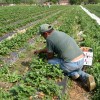 Immigration in Florida is a contested issue, and having an understanding of this issue can help facilitate communication. This 6-page fact sheet provide brief but clear information about the trends in policies that can be used by Extension agents to increase educated conversations around immigration issues. Written by Agricultural Education and Communication, and published by the UF Department of Chandra Bowden, Alexa Lamm, Hannah Carter, Tracy Irani, and Sebastian Galindo, December 2012.
Immigration in Florida is a contested issue, and having an understanding of this issue can help facilitate communication. This 6-page fact sheet provide brief but clear information about the trends in policies that can be used by Extension agents to increase educated conversations around immigration issues. Written by Agricultural Education and Communication, and published by the UF Department of Chandra Bowden, Alexa Lamm, Hannah Carter, Tracy Irani, and Sebastian Galindo, December 2012.
http://edis.ifas.ufl.edu/wc132
Tag: Alexa Lamm
Finding Grant Opportunities to Support County Extension Programs (WC134)
 This 3-page fact sheet presents information about where to look for grant opportunities, what to look for when reviewing grant opportunities, and how to determine if the opportunity fits your idea. Written by Amy Harder, Alexa Lamm, and Sebastian Galindo, and published by the UF Department of Agricultural Education and Communication, December 2012.
This 3-page fact sheet presents information about where to look for grant opportunities, what to look for when reviewing grant opportunities, and how to determine if the opportunity fits your idea. Written by Amy Harder, Alexa Lamm, and Sebastian Galindo, and published by the UF Department of Agricultural Education and Communication, December 2012.
http://edis.ifas.ufl.edu/wc134
Evaluating Extension Programs (WC109)
Is program evaluation just a “necessary evil” for Extension program implementation? Or, rather, an opportunity to identify and document accomplishments and discover ways to strengthen the impact of programs? This 5-page fact sheet defines evaluation, explains why evaluation is important to Extension programming beyond accountability requirements, describes how UF/IFAS Extension agents are currently evaluating their programs, and makes suggestions for future evaluation efforts that will showcase the value of Extension programming to the public. Written by Alexa J. Lamm, Glenn D. Israel, David Diehl, and Amy Harder , and published by the UF Department of Agricultural Education and Communication, May 2011.
http://edis.ifas.ufl.edu/wc109
AEC401/WC082 Using Mentoring as a Part of Professional Development
AEC-401, a 5-page fact sheet by Alexa Lamm and Amy Harder, defines mentoring, give a brief history, and reviews the stages of the mentoring process. It will also highlight the benefits mentors, protégés, and organizations can expect from the utilization of a mentoring process. Published by the UF Department of Agricultural Education and Communication, December 2008.
http://edis.ifas.ufl.edu/WC082